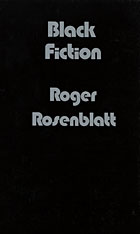
In this illuminating book Roger Rosenblatt offers both sensitive analyses of individual works and a provocative and compelling thesis. He argues that black fiction has a unity deriving not from any chronological sequence, or simply from its black authorship, but from a particular cyclical conception of history on which practically every significant black American novel and short story is based. Marked for oppression by an external physical characteristic, black characters struggle constantly against and within a hostile world.
Rosenblatt's analysis of the way black protagonists try to break historical patterns provides an integrated and sustained interpretation of motives and methods in black fiction. The black hero, after starting on a circular track, may try to change direction by means of his youth, love, education, or humor; or he may try to escape into his own elusive and vague history. But, as Rosenblatt demonstrates, these attempts all fail. And the black hero discovers in the failure of his attempts that the society which caused all this failure is not only unattainable but undesirable. Neither a sociological study nor a routine survey, this is distinctly a work of literary criticism which concentrates on black fiction as literature.

Consider this paradox: Ecologists estimate that it would take three planets Earth to provide an American standard of living to the entire world. Yet it is that standard of living to which the whole world aspires.
In Consuming Desires, award-winning writer and social commentator Roger Rosenblatt brings together a brilliant collection of thinkers and writers to shed light on the triumphs and tragedies of that disturbing paradox. The book represents a captivating salon, offering a rich and varied dialogue on the underlying roots of consumer culture and its pervasive impact on ourselves and the world around us. Each author offers a unique perspective, their layers of thoughts and insights building together to create a striking, multifaceted picture of our society and culture.
Jane Smiley probes the roots of consumerism in the emancipation of women from household drudgery afforded by labor-saving devices and technological innovation; Alex Kotlowitz describes the mutual reinforcement of fashion trends as poor inner-city kids and rich suburban kids strive to imitate each other; Bill McKibben discusses the significance, and the irony, of defining yourself not by what you buy, but by what you don't buy.
The essays range widely, but two ideas are central to nearly all of them: that consumption is driven by yearning and desire -- often unspoken, seemingly insatiable -- and that what prevents us from keeping our consumptive impulse in check is the western concept of self, the solitary and restless self, entitled to all it can pay for.
As Rosenblatt explains in his insightful introduction: "Individualism and desire are what makes us great and what makes us small. Freedom is our dream and our enemy. The essays touch on these paradoxes, and while all are too nuanced and graceful to preach easy reform, they give an idea of what reform means, where it is possible, and, in some cases, where it may not be as desirable as it appears."
READERS
Browse our collection.
PUBLISHERS
See BiblioVault's publisher services.
STUDENT SERVICES
Files for college accessibility offices.
UChicago Accessibility Resources
home | accessibility | search | about | contact us
BiblioVault ® 2001 - 2024
The University of Chicago Press









